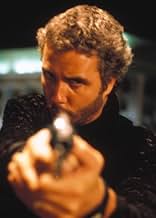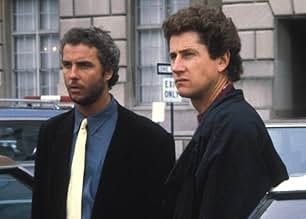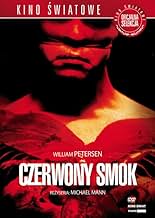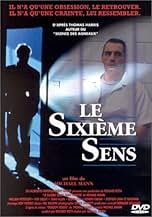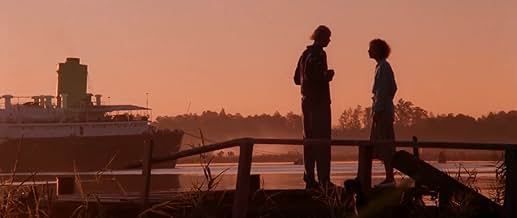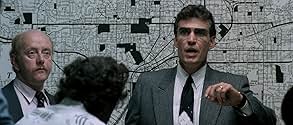Former FBI profiler Will Graham returns to service to pursue a deranged serial killer dubbed "the Tooth Fairy" by the media.Former FBI profiler Will Graham returns to service to pursue a deranged serial killer dubbed "the Tooth Fairy" by the media.Former FBI profiler Will Graham returns to service to pursue a deranged serial killer dubbed "the Tooth Fairy" by the media.
- Awards
- 1 win & 1 nomination
Dan Butler
- Jimmy Price
- (as Dan E. Butler)
Alexandra Neil
- Eileen
- (as Alex Neil)
- Director
- Writers
- All cast & crew
- Production, box office & more at IMDbPro
Storyline
Did you know
- TriviaDuring the filming of this movie, Sir Anthony Hopkins was playing King Lear at the National Theatre. During the filming of The Silence of the Lambs (1991), Brian Cox was playing King Lear at the National Theatre.
- Goofs(at around 1h 50 mins) The movie implies that Will Graham uses a Charter Arms Bulldog .44 special pistol. If this were true, then Will could not shoot Francis Dollarhyde six times. A Charter Arms Bulldog only holds five rounds. Graham actually shoots the gun seven times, but two of the shots are repeated; the first and second shot that we see are actually the same one, as are the six and seventh. Thus, he only actually fires five bullets, which is the number that the gun can hold.
- Quotes
Will Graham: I know that I'm not smarter than you.
Dr. Hannibal Lecktor: Then how did you catch me?
Will Graham: You had disadvantages.
Dr. Hannibal Lecktor: What disadvantages?
Will Graham: You're insane.
- Alternate versionsThe Hannibal Lecter Collection released by MGM in 2007, which also features The Silence of the Lambs (1991) and Hannibal (2001), contains the authentic Theatrical Cut of the film.
- ConnectionsFeatured in The Prime Movers: Strong As I Am (1986)
- SoundtracksGraham's Theme
Created, Performed and Composed by Michel Rubini
Composed by Michel Rubini on the Synclavier Digital Music System
Featured review
I'm starting to think that I may be one of the only people who saw this film when it was originally theatrically released! Years after that, as a freshman in college, I was managing a video store when a woman came in looking for the recently released `Silence of the Lambs.' She said she knew William Petersen from childhood and told me that he was in THE first Hannibal the Cannibal movie. Having not read the novel or seen the movie for a while, I never related the two before that. But I specifically remembered `Manhunter' for its creepy killer, spectacular use of Iron Butterfly, and the strange & frightening notion (for then) of FBI profiling. These three details alone speak volumes for the film's acting, style and writing. The irony of forcing oneself to share the same maniacal thoughts as a killer in order to catch them is the stuff of nightmares. Since reconnecting with `Manhunter' back then, I've remained a constant fan of the film.
But the film suffers today in several ways. First off, any comparison to `Silence of the Lambs' is going to come up short. `Silence' is simply a better film a classic of the highest caliber that will continue to sustain itself with the passage of time. Those already acquainted with Jonathan Demme's world will probably have a hard time accepting `Manhunter.' But audiences should judge the film on its own merits, and recognize that unlike `Red Dragon' it was not designed to resemble an established world of a classic movie which is both a curse and an advantage for both films. I recently saw `Red Dragon,' by the way, and loved it. Walking out, I found myself asking whether I liked it better than `Manhunter.' These comparisons can get very silly because not only am I basing my impressions on a book, but also a previously filmed version and a closely related `sequel.' Best method: let each stand alone, THEN decide if either was successful. Both films succeed for similar and different reasons.
The approach of `Manhunter' is much more cold and observational than `Red Dragon.' This style (often concerned with widely symmetrical composition), like Kubrick's, can greatly benefit the story if used properly. I really liked it here. The neatness and sterility of the 80s décor also works perfectly in this format, providing a nice contrast to the horrors sometimes contained within its walls.
As for the music, it has not aged well. The synthesized stuff in the first hour is effective at times (especially when it's just a single, sustained note a la John Carpenter, or those bits that sound like `Blade Runner'), and the inclusion of In-a-Gadda-da-Vida is inspired, but the electronic balladry during Dolarhyde's romance is simply awful and detract from the scenes. Obviously, the danger of using such modern music is that it can become outdated and cheesy very quick. Is it just me, or does this especially seem true of 80s music? Given Michael Mann's career, he clearly wouldn't agree. I guess one never knows. The Tangerine Dream score for `Risky Business' or Phillip Glass' for `Thin Blue Line,' for example, still hold up remarkably well from this period.
The performances, however, are still wonderful. Petersen (whom I've heard didn't like the job he did) reaches just the right blend of seeming haunted, detached, morose, and as Dolarhyde describes him, purposeful. Dennis Farina, himself a former Chicago cop, exudes realistic authority as Jack Crawford. Tom Noonan obtains a disturbing childlike innocence and deliberation in his terror. And Brian Cox poor guy, will always be compared to Anthony Hopkins. It's unfair because he gives us a Lecter that is different, to be sure, but intelligent in a way that, to me, is more realistic, intriguing and ultimately frightening. Hopkins' Hannibal is so supremely horrible that he's practically supernatural at this point, not unlike Dracula or the Wolfman. I enjoy all of that too, but just on a different level.
8/10
But the film suffers today in several ways. First off, any comparison to `Silence of the Lambs' is going to come up short. `Silence' is simply a better film a classic of the highest caliber that will continue to sustain itself with the passage of time. Those already acquainted with Jonathan Demme's world will probably have a hard time accepting `Manhunter.' But audiences should judge the film on its own merits, and recognize that unlike `Red Dragon' it was not designed to resemble an established world of a classic movie which is both a curse and an advantage for both films. I recently saw `Red Dragon,' by the way, and loved it. Walking out, I found myself asking whether I liked it better than `Manhunter.' These comparisons can get very silly because not only am I basing my impressions on a book, but also a previously filmed version and a closely related `sequel.' Best method: let each stand alone, THEN decide if either was successful. Both films succeed for similar and different reasons.
The approach of `Manhunter' is much more cold and observational than `Red Dragon.' This style (often concerned with widely symmetrical composition), like Kubrick's, can greatly benefit the story if used properly. I really liked it here. The neatness and sterility of the 80s décor also works perfectly in this format, providing a nice contrast to the horrors sometimes contained within its walls.
As for the music, it has not aged well. The synthesized stuff in the first hour is effective at times (especially when it's just a single, sustained note a la John Carpenter, or those bits that sound like `Blade Runner'), and the inclusion of In-a-Gadda-da-Vida is inspired, but the electronic balladry during Dolarhyde's romance is simply awful and detract from the scenes. Obviously, the danger of using such modern music is that it can become outdated and cheesy very quick. Is it just me, or does this especially seem true of 80s music? Given Michael Mann's career, he clearly wouldn't agree. I guess one never knows. The Tangerine Dream score for `Risky Business' or Phillip Glass' for `Thin Blue Line,' for example, still hold up remarkably well from this period.
The performances, however, are still wonderful. Petersen (whom I've heard didn't like the job he did) reaches just the right blend of seeming haunted, detached, morose, and as Dolarhyde describes him, purposeful. Dennis Farina, himself a former Chicago cop, exudes realistic authority as Jack Crawford. Tom Noonan obtains a disturbing childlike innocence and deliberation in his terror. And Brian Cox poor guy, will always be compared to Anthony Hopkins. It's unfair because he gives us a Lecter that is different, to be sure, but intelligent in a way that, to me, is more realistic, intriguing and ultimately frightening. Hopkins' Hannibal is so supremely horrible that he's practically supernatural at this point, not unlike Dracula or the Wolfman. I enjoy all of that too, but just on a different level.
8/10
- billymac72
- Oct 13, 2002
- Permalink
Details
- Release date
- Country of origin
- Official site
- Language
- Also known as
- El sabueso
- Filming locations
- High Museum of Art - 1280 Peachtree Street, Atlanta, Georgia, USA(Lecktor's prison exteriors)
- Production companies
- See more company credits at IMDbPro
Box office
- Budget
- $15,000,000 (estimated)
- Gross US & Canada
- $8,620,929
- Opening weekend US & Canada
- $2,204,400
- Aug 17, 1986
- Gross worldwide
- $8,624,009
- Runtime2 hours
- Color
- Aspect ratio
- 2.35 : 1
Contribute to this page
Suggest an edit or add missing content











